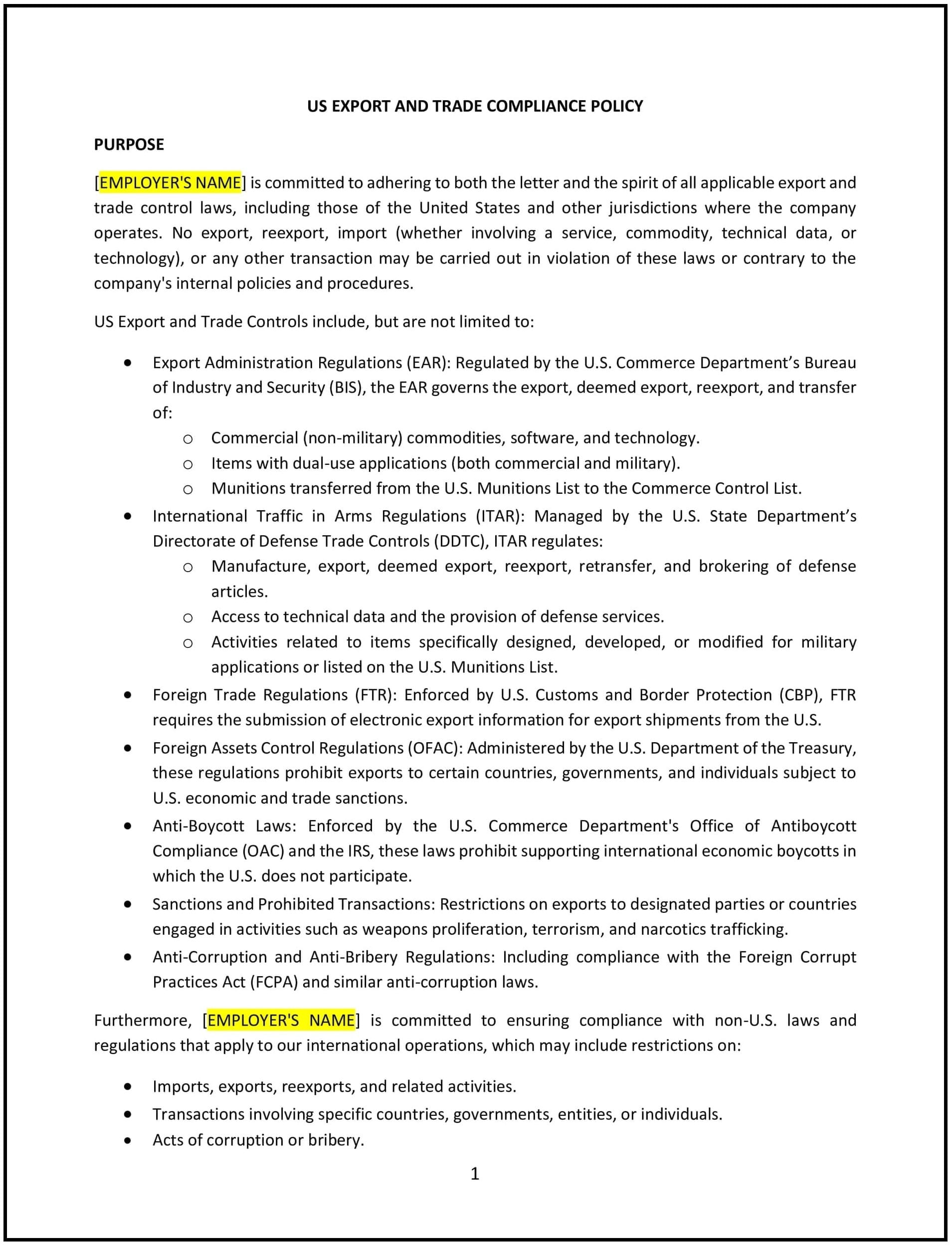US export and trade compliance policy (Ohio): Free template
Got contracts to review? While you're here for policies, let Cobrief make contract review effortless—start your free review now.

Customize this template for free
US export and trade compliance policy (Ohio)
A US export and trade compliance policy outlines the guidelines for Ohio businesses to ensure they comply with federal regulations regarding the export of goods, services, and technologies, including compliance with the Export Administration Regulations (EAR), the International Traffic in Arms Regulations (ITAR), and other relevant trade laws. The policy defines the business's obligations in relation to restricted countries, individuals, or entities and sets procedures for obtaining the necessary licenses and approvals before conducting international transactions. It also provides steps for monitoring and auditing compliance and mitigating risks associated with export violations.
By implementing this policy, Ohio businesses can ensure they adhere to US export laws, minimize legal risks, and foster international business relations while promoting ethical trade practices.
How to use this US export and trade compliance policy (Ohio)
- Define export regulations: The policy should specify the key US export regulations, including the Export Administration Regulations (EAR), the International Traffic in Arms Regulations (ITAR), and the Office of Foreign Assets Control (OFAC) sanctions. It should outline the specific regulations that apply to the business’s operations and international transactions.
- Identify restricted parties and countries: The policy should list countries, entities, or individuals that are subject to export restrictions or sanctions under US law. The policy should define the process for screening customers, suppliers, and business partners against relevant restricted party lists, including OFAC’s Specially Designated Nationals (SDN) list.
- Set procedures for obtaining licenses: The policy should specify the steps employees must follow to obtain the necessary export licenses, including the approval process, required documentation, and relevant government agencies to contact for authorization.
- Outline prohibited transactions: The policy should clearly state the types of transactions that are prohibited under US export laws, such as exporting goods or technologies to sanctioned countries, or engaging in trade with restricted individuals or entities.
- Specify record-keeping requirements: The policy should establish procedures for maintaining records of export transactions, including invoices, shipping documents, licenses, and communications with government agencies. These records should be kept for the required period, typically five years.
- Provide training and awareness: The policy should mandate training for employees involved in international trade, ensuring they understand export compliance requirements and the consequences of violations.
- Monitor and audit compliance: The policy should outline the business’s internal processes for monitoring and auditing export transactions to ensure compliance with US export laws. This may include regular reviews of international transactions, screenings of customers and suppliers, and audits of export-related documentation.
- Review and update regularly: The policy should be reviewed periodically to ensure it remains aligned with changes in US export laws, global trade regulations, and the evolving needs of the business.
Benefits of using this US export and trade compliance policy (Ohio)
This policy provides several key benefits for Ohio businesses:
- Reduces legal and financial risks: By ensuring compliance with US export laws, the policy helps businesses minimize the risk of fines, penalties, and legal action resulting from export violations.
- Protects the business’s reputation: Adhering to trade compliance regulations demonstrates the business’s commitment to ethical business practices and helps build trust with international partners, customers, and government authorities.
- Promotes business continuity: The policy helps ensure that export activities are conducted smoothly and without disruption by addressing potential legal and regulatory risks before they arise.
- Enhances international relations: By complying with US export laws, the business can foster strong, legally sound relationships with global customers, suppliers, and business partners.
- Improves operational efficiency: Establishing clear procedures for export compliance reduces confusion and ensures that employees involved in international trade understand their responsibilities and the steps required for legal and ethical business operations.
- Supports business growth: A robust export compliance policy allows businesses to expand into new international markets with confidence, knowing that they are compliant with US trade laws and regulations.
- Mitigates export-related risks: The policy provides a framework for identifying and addressing potential risks related to export transactions, reducing the likelihood of unintentional violations and their associated costs.
Tips for using this US export and trade compliance policy (Ohio)
- Communicate the policy clearly: Ensure that all employees involved in international trade understand the export compliance policy by including it in the employee handbook, training sessions, and internal communications.
- Provide regular training: Conduct regular training on US export regulations, restricted parties, and procedures for obtaining licenses. Employees should understand the importance of compliance and the potential consequences of violations.
- Establish internal controls: Implement internal controls for monitoring and auditing export transactions, such as screening customers, suppliers, and business partners against relevant restricted party lists and maintaining accurate records.
- Work with legal advisors: Collaborate with legal experts or export compliance professionals to ensure the business is fully aware of the regulatory landscape and remains in compliance with all export laws.
- Use technology tools: Consider using export compliance software or tools to streamline the process of screening transactions, monitoring restricted parties, and ensuring compliance with export regulations.
- Monitor regulatory changes: Regularly monitor updates to US export regulations, such as changes to sanctioned countries or entities, and adjust the policy accordingly to stay compliant with the latest laws and regulations.
- Review the policy periodically: Review the export compliance policy at least annually to ensure it reflects any changes in Ohio state laws, federal regulations, or the business’s international trade practices. Make adjustments as necessary to stay compliant with evolving regulations.